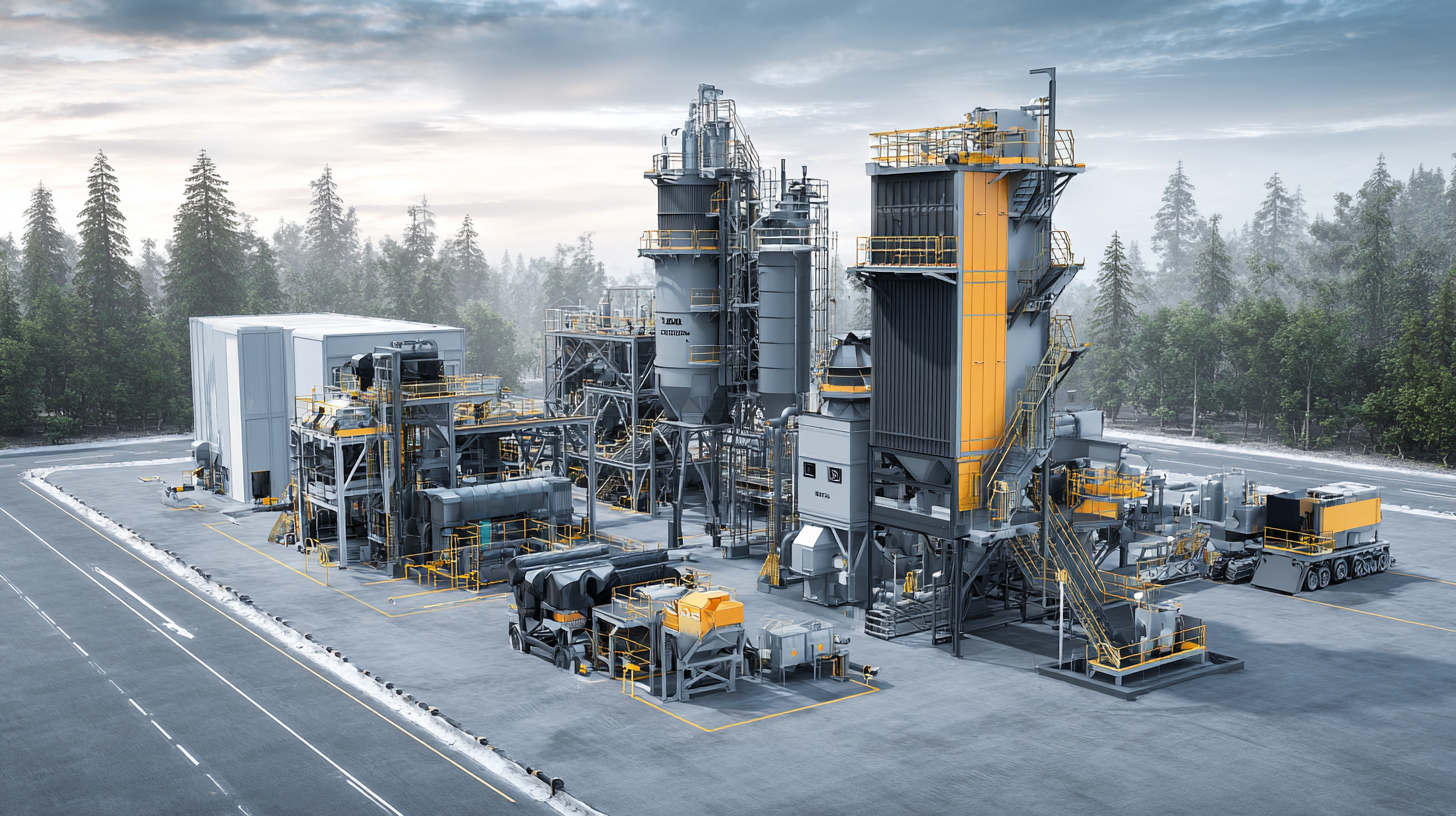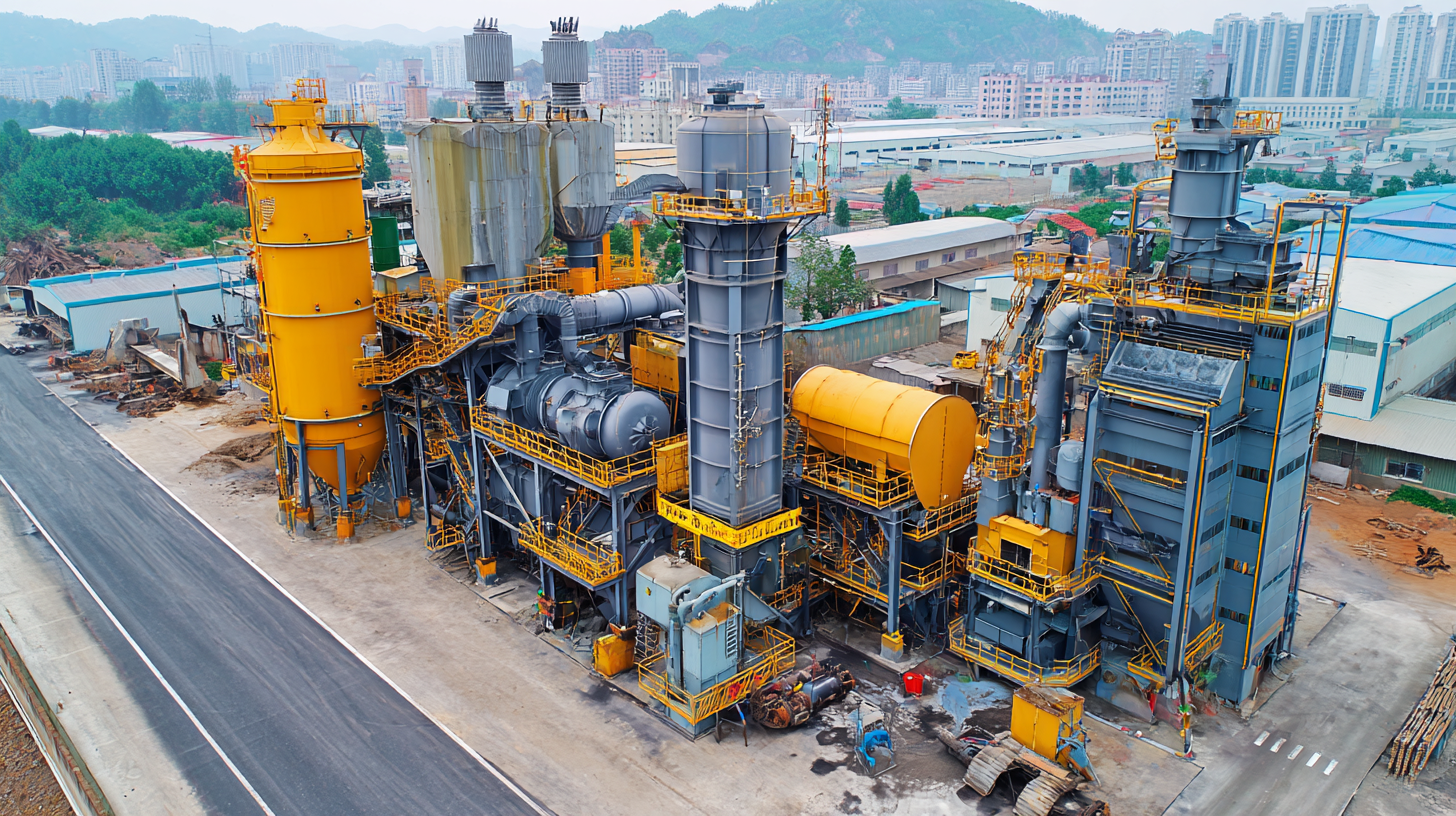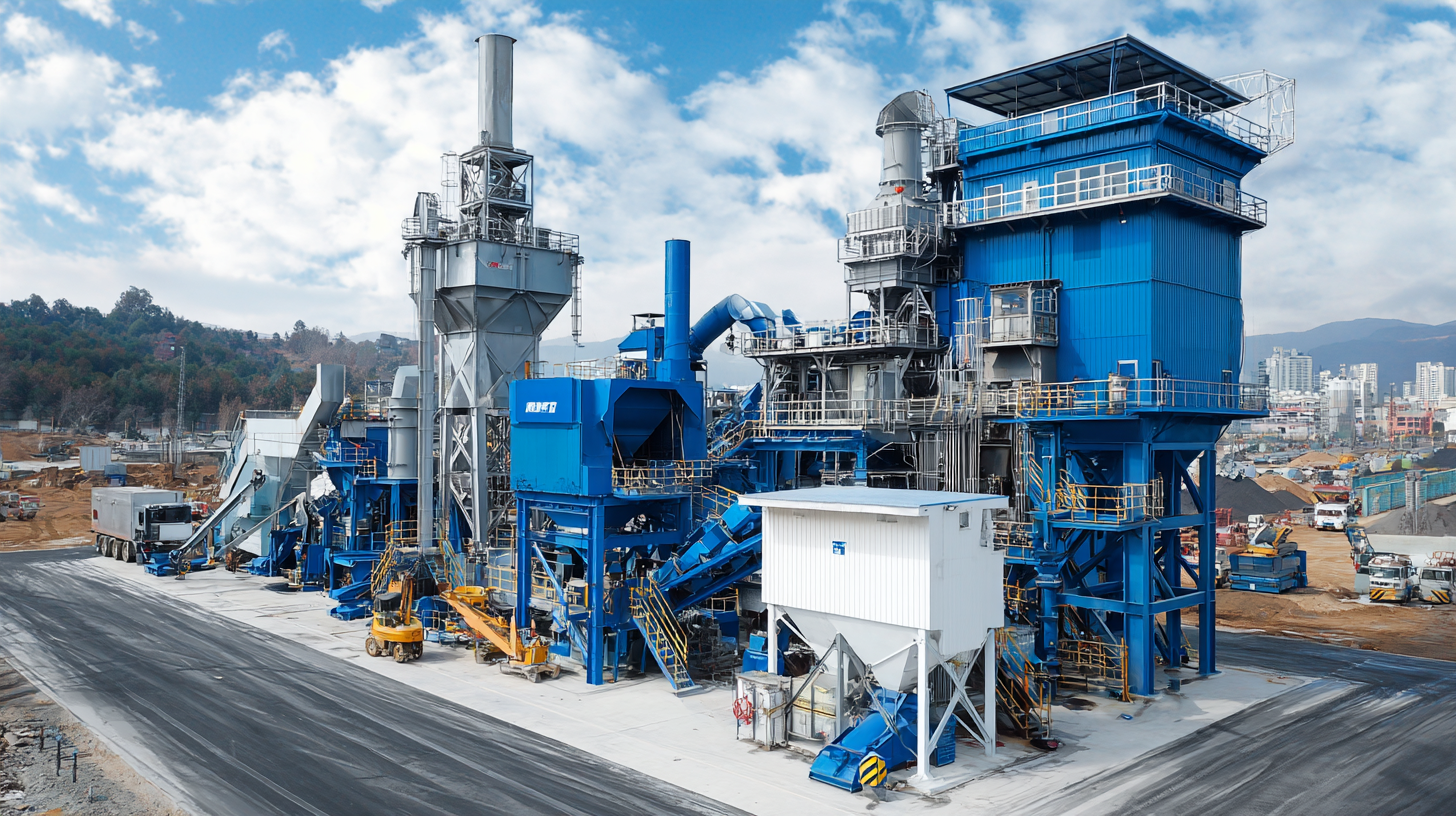10 Best Asphalt Mixing Plant Innovations Transforming Global Construction
The construction industry is rapidly evolving, and innovations in
Asphalt Mixing Plants
are at the forefront of this transformation. According to a recent report by
Grand View Research, the global asphalt
mixing plant market is expected to reach $7.8 billion
by 2025, driven by increasing
infrastructure development
and the rising demand for high-quality asphalt. As cities expand and transportation
networks become more complex, the need for
efficient and eco-friendly asphalt production
has never been more critical. This blog will explore the 10 best
innovations in asphalt mixing technology
that are significantly enhancing operational efficiency, reducing environmental impact,
and improving the quality of road construction worldwide. From advanced
automation systems to sustainable materials, these developments are shaping
the future of asphalt mixing and paving the way for smarter, more resilient infrastructure.
Innovative Technologies Driving Efficiency in Asphalt Mixing Plants
The asphalt mixing plant industry is witnessing remarkable innovations that are driving efficiency and sustainability across global construction projects. With a market projected to grow significantly by 2032, advancements in technology, particularly in modular and traditional methods, are paving the way for enhanced productivity. The recent industry conference in Xi'an highlighted key technologies in asphalt mixing and regeneration, showcasing the trend toward more integrated solutions that support both road and highway construction.
One of the most notable innovations is the development of batch versus continuous asphalt mixing plants, each suited for different applications and user requirements. The shift towards modern techniques, including hot recycling processes, is also transforming how construction firms approach materials usage, leading to significant cost savings and reduced environmental impact. Embracing these technologies allows construction companies to optimize their operations and meet regulatory demands.
**Tip:** When selecting an asphalt mixing plant, consider the specific needs of your projects, including the types of materials used and the volume of asphalt required. Investing in the latest technology can greatly enhance efficiency and reduce lifecycle costs. Additionally, staying updated with industry trends can help in making informed decisions that align with sustainability goals.
Innovative Technologies in Asphalt Mixing Plants
Sustainable Practices in Asphalt Production: The Rise of Eco-Friendly Solutions
As the construction industry faces increasing pressure to reduce its environmental impact, sustainable practices in asphalt production are gaining momentum. According to the World Economic Forum, the construction sector is responsible for approximately 39% of global carbon emissions, highlighting the urgent need for green alternatives. Innovations in eco-friendly asphalt mixing plants are paving the way for more sustainable operations, utilizing recycled materials and warm mix asphalt technologies that reduce emissions by up to 30% compared to traditional methods.
One of the most promising trends in asphalt production is the use of reclaimed asphalt pavement (RAP). The National Asphalt Pavement Association reports that nearly 99% of asphalt pavement is recyclable, and incorporating RAP not only conserves natural resources but also significantly lowers production costs. Advanced mixing technologies that ensure optimal integration of recycled materials are now increasingly common, providing high-quality outputs while promoting sustainability.
The rise of eco-friendly solutions in the asphalt industry reflects a broader commitment to greener construction practices, setting a new standard for future projects globally.
Smart Automation: How AI is Revolutionizing Asphalt Mixing Operations
The integration of smart automation in asphalt mixing operations is transforming the construction industry significantly. According to a report by MarketsandMarkets, the global intelligent asphalt mixing plant market is projected to reach USD 6.94 billion by 2027, growing at a CAGR of 4.9% during the forecast period. This rise is chiefly attributed to advancements in artificial intelligence (AI) and machine learning (ML) technologies, which enhance efficiency and accuracy in asphalt production. AI-driven solutions enable predictive maintenance, reducing downtime and operational costs by an estimated 20%, according to a study by McKinsey & Company.
Tip: To maximize the benefits of AI in your asphalt mixing operations, consider implementing a real-time data monitoring system. This allows for immediate adjustments based on environmental factors and demand changes, ensuring consistent product quality and better resource management.
Moreover, these innovations facilitate improved quality control through automated systems that can detect inconsistencies in the mixture and adjust the components dynamically. For instance, AI algorithms are now capable of analyzing vast datasets to optimize the recipes for various asphalt types, significantly speeding up the production process and ensuring adherence to stringent environmental standards.
Tip: Collaborating with tech experts to tailor AI solutions to your specific needs can lead to a significant competitive advantage, paving the way for more sustainable practices in the asphalt industry.
Enhanced Quality Control: Innovations Ensuring Superior Asphalt Mixtures
 In the rapidly evolving landscape of global construction, enhanced quality control in asphalt mixing plants is a critical innovation that ensures superior asphalt mixtures. As demand for durable, high-performance roads increases, the industry has recognized the necessity of stringent quality assurance measures. Modern mixing plants now utilize advanced technologies such as automated systems and real-time monitoring to meticulously track and control the various components of asphalt production. These innovations enable precise adjustments in material ratios and temperature, resulting in consistent high-quality outputs.
In the rapidly evolving landscape of global construction, enhanced quality control in asphalt mixing plants is a critical innovation that ensures superior asphalt mixtures. As demand for durable, high-performance roads increases, the industry has recognized the necessity of stringent quality assurance measures. Modern mixing plants now utilize advanced technologies such as automated systems and real-time monitoring to meticulously track and control the various components of asphalt production. These innovations enable precise adjustments in material ratios and temperature, resulting in consistent high-quality outputs.
Moreover, the integration of artificial intelligence and machine learning in quality control processes has revolutionized asphalt production. These technologies offer predictive analytics that help foremen identify potential inconsistencies in mixtures before they affect the final product. By employing sophisticated algorithms to analyze data from past projects, companies can make informed decisions about material selection and processing techniques. This not only enhances the reliability of asphalt mixtures but also significantly reduces waste, paving the way for more sustainable construction practices. As the industry continues to adopt these innovations, the future of asphalt mixing looks not only more efficient but also far more resilient.
Cost-Effective Strategies: Optimizing Resources in Asphalt Plant Operations
In the competitive landscape of asphalt plant operations, implementing cost-effective strategies is crucial for optimizing resources. According to a recent report by the National Asphalt Pavement Association (NAPA), approximately 75% of asphalt production costs stem from raw materials and energy consumption. By investing in innovative technologies—such as warm-mix asphalt (WMA)—plants can significantly reduce emissions and energy use by as much as 30%, translating into lower operational costs while maintaining high-quality output.

In addition to technological advancements, adopting lean manufacturing principles can drive efficiency within asphalt operations. A study highlighted in the Journal of Construction Engineering and Management indicates that companies implementing lean techniques achieved a 20% increase in productivity and a reduction of waste by 25%. Furthermore, data from the Asphalt Institute shows that optimal scheduling and inventory management can lead to a 15% improvement in resource utilization. By focusing on these strategies, asphalt mixing plants can not only enhance their profitability but also contribute to sustainable construction practices on a global scale.

Home
About Us
Products
 Concrete Mixing Plant
Concrete Mixing Plant
 HZS Series Belt Concrete Mixing Plant
HZS Series Belt Concrete Mixing Plant
 HZS Series Bucket-Lifting Type Container Concrete Mixing Plant
HZS Series Bucket-Lifting Type Container Concrete Mixing Plant
 HZS60 Mobile Concrete Mixing Plant
HZS60 Mobile Concrete Mixing Plant
 HZS Series Bucket-Lifting Type Concrete Mixing Plant
HZS Series Bucket-Lifting Type Concrete Mixing Plant
 HZS Series Mobile Concrete Mixing Plant
HZS Series Mobile Concrete Mixing Plant
 HZS Series Top-Mounted Concrete Mixing plant
HZS Series Top-Mounted Concrete Mixing plant
 HZS Series Semi-Top Mounted Concrete Mixing Plant
HZS Series Semi-Top Mounted Concrete Mixing Plant
 Stabilized Soil Mixing Plant
Stabilized Soil Mixing Plant
 Asphalt Mixing Plant
Asphalt Mixing Plant
 Sand & Gravel Crushing and Screening Plant
Sand & Gravel Crushing and Screening Plant
 RTPF350DS Crawler Mobile Impact Crushing Plant
RTPF350DS Crawler Mobile Impact Crushing Plant
 RT116JH Crawler Mobile Jaw Crushing Plant
RT116JH Crawler Mobile Jaw Crushing Plant
 RT116JE Crawler Mobile Jaw Crushing Plant
RT116JE Crawler Mobile Jaw Crushing Plant
 RT300CE Crawler Mobile Cone Crushing Plant
RT300CE Crawler Mobile Cone Crushing Plant
 RT300CH Crawler Mobile Cone Crushing Plant
RT300CH Crawler Mobile Cone Crushing Plant
 RT5015H Mobile Scalping Screen
RT5015H Mobile Scalping Screen
 RT315VSIE Crawler Mobile Sand Maker
RT315VSIE Crawler Mobile Sand Maker
 RT3YK6020 Crawler Mobile Screening Plant
RT3YK6020 Crawler Mobile Screening Plant
 RT3YK6020M Modular Screening Plant
RT3YK6020M Modular Screening Plant
 RTF260M Modular Counterattack Crushing and Screening Integrated Machine
RTF260M Modular Counterattack Crushing and Screening Integrated Machine
 RTF350M Modular Impact Crushing Plant
RTF350M Modular Impact Crushing Plant
 RTF450M Modular Impact Crushing Plant
RTF450M Modular Impact Crushing Plant
 Construction Waste Resourceful Treatment Line
Construction Waste Resourceful Treatment Line
Performances
Video
News
Blog
Contact Us
 WDB Series Foundation-Free Stability Soil Mixing Plant
WDB Series Foundation-Free Stability Soil Mixing Plant LCB Series Emulsified Asphalt Cold Regeneration Secondary Mixing Plant
LCB Series Emulsified Asphalt Cold Regeneration Secondary Mixing Plant LB Series Asphalt Mixing Plant
LB Series Asphalt Mixing Plant LBR Series Integrated Asphalt Mixing Plant
LBR Series Integrated Asphalt Mixing Plant LBRN Series Counterflow Integral Asphalt Mixing Plant
LBRN Series Counterflow Integral Asphalt Mixing Plant RZS Series Asphalt Mixing Plant
RZS Series Asphalt Mixing Plant RTZS120 Series RAP Crushing & Screening Plant
RTZS120 Series RAP Crushing & Screening Plant Construction Waste Resourceful Treatment Line
Construction Waste Resourceful Treatment Line
 In the rapidly evolving landscape of global construction, enhanced quality control in asphalt mixing plants is a critical innovation that ensures superior asphalt mixtures. As demand for durable, high-performance roads increases, the industry has recognized the necessity of stringent quality assurance measures. Modern mixing plants now utilize advanced technologies such as automated systems and real-time monitoring to meticulously track and control the various components of asphalt production. These innovations enable precise adjustments in material ratios and temperature, resulting in consistent high-quality outputs.
In the rapidly evolving landscape of global construction, enhanced quality control in asphalt mixing plants is a critical innovation that ensures superior asphalt mixtures. As demand for durable, high-performance roads increases, the industry has recognized the necessity of stringent quality assurance measures. Modern mixing plants now utilize advanced technologies such as automated systems and real-time monitoring to meticulously track and control the various components of asphalt production. These innovations enable precise adjustments in material ratios and temperature, resulting in consistent high-quality outputs.





